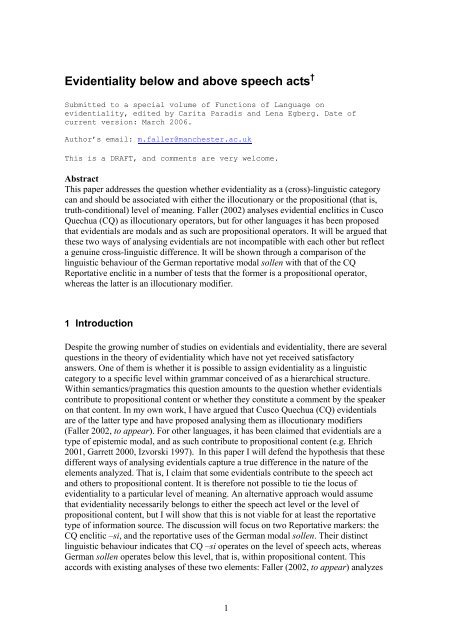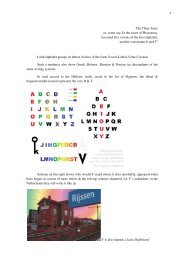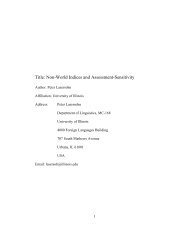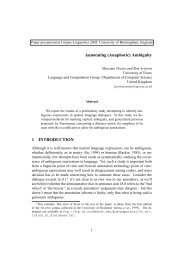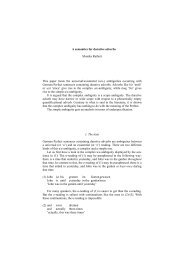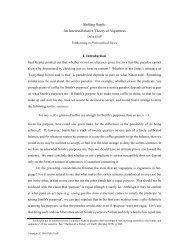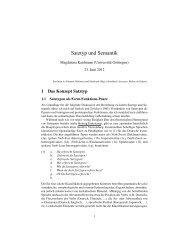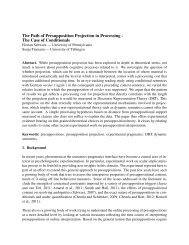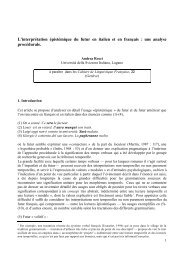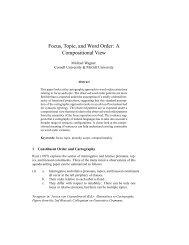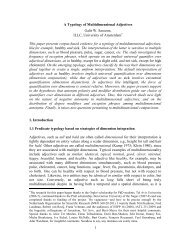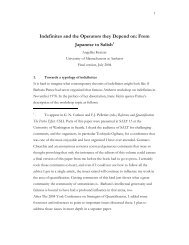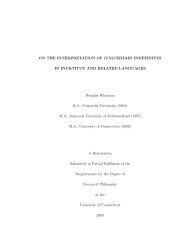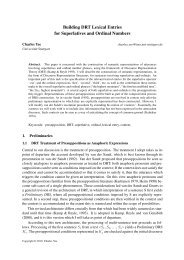Evidentiality below and above speech acts† - Semantics Archive
Evidentiality below and above speech acts† - Semantics Archive
Evidentiality below and above speech acts† - Semantics Archive
Create successful ePaper yourself
Turn your PDF publications into a flip-book with our unique Google optimized e-Paper software.
<strong>Evidentiality</strong> <strong>below</strong> <strong>and</strong> <strong>above</strong> <strong>speech</strong> acts †<br />
Submitted to a special volume of Functions of Language on<br />
evidentiality, edited by Carita Paradis <strong>and</strong> Lena Egberg. Date of<br />
current version: March 2006.<br />
Author’s email: m.faller@manchester.ac.uk<br />
This is a DRAFT, <strong>and</strong> comments are very welcome.<br />
Abstract<br />
This paper addresses the question whether evidentiality as a (cross)-linguistic category<br />
can <strong>and</strong> should be associated with either the illocutionary or the propositional (that is,<br />
truth-conditional) level of meaning. Faller (2002) analyses evidential enclitics in Cusco<br />
Quechua (CQ) as illocutionary operators, but for other languages it has been proposed<br />
that evidentials are modals <strong>and</strong> as such are propositional operators. It will be argued that<br />
these two ways of analysing evidentials are not incompatible with each other but reflect<br />
a genuine cross-linguistic difference. It will be shown through a comparison of the<br />
linguistic behaviour of the German reportative modal sollen with that of the CQ<br />
Reportative enclitic in a number of tests that the former is a propositional operator,<br />
whereas the latter is an illocutionary modifier.<br />
1 Introduction<br />
Despite the growing number of studies on evidentials <strong>and</strong> evidentiality, there are several<br />
questions in the theory of evidentiality which have not yet received satisfactory<br />
answers. One of them is whether it is possible to assign evidentiality as a linguistic<br />
category to a specific level within grammar conceived of as a hierarchical structure.<br />
Within semantics/pragmatics this question amounts to the question whether evidentials<br />
contribute to propositional content or whether they constitute a comment by the speaker<br />
on that content. In my own work, I have argued that Cusco Quechua (CQ) evidentials<br />
are of the latter type <strong>and</strong> have proposed analysing them as illocutionary modifiers<br />
(Faller 2002, to appear). For other languages, it has been claimed that evidentials are a<br />
type of epistemic modal, <strong>and</strong> as such contribute to propositional content (e.g. Ehrich<br />
2001, Garrett 2000, Izvorski 1997). In this paper I will defend the hypothesis that these<br />
different ways of analysing evidentials capture a true difference in the nature of the<br />
elements analyzed. That is, I claim that some evidentials contribute to the <strong>speech</strong> act<br />
<strong>and</strong> others to propositional content. It is therefore not possible to tie the locus of<br />
evidentiality to a particular level of meaning. An alternative approach would assume<br />
that evidentiality necessarily belongs to either the <strong>speech</strong> act level or the level of<br />
propositional content, but I will show that this is not viable for at least the reportative<br />
type of information source. The discussion will focus on two Reportative markers: the<br />
CQ enclitic –si, <strong>and</strong> the reportative uses of the German modal sollen. Their distinct<br />
linguistic behaviour indicates that CQ –si operates on the level of <strong>speech</strong> acts, whereas<br />
German sollen operates <strong>below</strong> this level, that is, within propositional content. This<br />
accords with existing analyses of these two elements: Faller (2002, to appear) analyzes<br />
1
CQ –si as an illocutionary modifier, <strong>and</strong> Ehrich (2001) analyzes reportative sollen<br />
within possible world semantics along the same lines as other German modals.<br />
The article is structured as follows. Section two presents data illustrating the<br />
basic uses of the CQ Reportative evidential <strong>and</strong> German sollen. Section three discusses<br />
linguistic tests for distinguishing between illocutionary meaning <strong>and</strong> propositional<br />
content <strong>and</strong> applies these to the two Reportatives. The main conclusions are<br />
summarized in section 4.<br />
2 The CQ <strong>and</strong> German Reportatives<br />
<strong>Evidentiality</strong> is the linguistic marking of the speaker’s source of information in<br />
assertions (or, in some languages, including CQ, the grounds for asking a question<br />
(Faller 2002)). One prominent evidential subcategory is the specification of the source<br />
as second-h<strong>and</strong>, that is, information that was acquired through reports by others. The<br />
focus of this paper are markers of this evidential category in CQ <strong>and</strong> German. The other<br />
two major categories are Inference <strong>and</strong> Direct evidence, where many languages<br />
combine Reported <strong>and</strong> Inference in a single Indirect evidential (Willett 1988).<br />
As in my previous work, I take a narrow view of evidentiality as a distinct<br />
category from epistemic modality. Epistemic modals specify the speaker’s degree of<br />
certainty <strong>and</strong>/or the necessity/possibility of the truth of the propositional content.<br />
Conceptually, the two categories are clearly distinct, though empirically it is often not<br />
easy to determine for a given morpheme whether it is an evidential or an epistemic<br />
modal. Neither the CQ Reportative nor German sollen necessarily express epistemic<br />
modality, though a degree of certainty may be implicated by both in certain contexts.<br />
Two criteria that are usually assumed for classifying a marker as an evidential are (i)<br />
that the maker in question encodes an evidential value as its primary meaning, <strong>and</strong> (ii)<br />
that it is a grammatical element (Anderson 1986, Aikhenvald 2004). The CQ<br />
Reportative fulfils both of these <strong>and</strong> can straightforwardly be classified as an evidential,<br />
though we will see in section 2.2 <strong>below</strong> that for German sollen the matter is less clear.<br />
2.1 The Cusco Quechua Reportative<br />
CQ 1 possesses three evidential enclitics: -mi (allomorph -n) indicates that the speaker<br />
has the best possible grounds in support of the proposition expressed p, which often<br />
amounts to having direct evidence for p; -chá marks that the speaker conjectures that p,<br />
<strong>and</strong> -si (allomorphs -s, -sis) indicates that the speaker was told that p. The examples in<br />
(1) illustrate the three evidentials in indicative sentences. 2 As shown in (1d), the<br />
evidential enclitics may be left out, in which case best possible grounds is implicated<br />
(Faller 2002).<br />
(1) a. Subrina-y-wan-mi tiya-sha-n.<br />
niece-1-COM-BPG live-PROG-3<br />
p=‘He is living with my niece.’<br />
EV: s saw that he is living with her niece. (Conv)<br />
2
. Congresista-manta-s haykuy-ta muna-n<br />
congressman-ABL-REP enter-ACC want-3<br />
p=‘He wants to be a Congressman.’<br />
EV: s was told that p (Conv)<br />
c. Wañu-pu-n-ña-chá.<br />
die-BEN-3-DISC-CONJ<br />
p=‘He will have died already.’<br />
EV: s conjectures that he died already (based on the fact that he was already very<br />
old when she knew him as a child) (Conv)<br />
d. Puklla-sha-n-ku kay uray-lla-pi.<br />
play-PROG-3-PL this down-LIM-LOC<br />
p=‘They are playing just down there.’ (Conv)<br />
The meanings of the three CQ evidential enclitics are described in Faller<br />
(2002), <strong>and</strong> I will here only illustrate the meaning of the Reportative -si in some detail,<br />
as it is the focus of this paper. The meaning of Reportative -si is easily described: the<br />
speaker reports what someone else has said, 3 be it to talk about daily events as in (1b),<br />
to tell stories as in (2a), or to report news as in (2b) (a news story about the mugging of<br />
a tourist).<br />
(2) a. Chayan-si ukuku uña-qa. Punku-ta-s taka-ku-n,<br />
arrive-REP bear baby.animal-TOP door-ACC-REP knock-REFL-3<br />
ch’in. Huk punku-ta-s taka-ku-n, ch’in.<br />
silent other door-ACC-REP knock-REFL-3 silent<br />
p=‘The son of the bear arrived. He knocked on a door, silence. He<br />
knocked on another door, silence.’<br />
EV: reportative information source. (Itier 1999:44)<br />
b. wakin-si maqa-mu-n-ku hayt’a-mu-n-ku, wakin-taq-si riki<br />
some-REP hit-CIS-3-PL kick-CIS-3-PL some-CONTR-REP right<br />
ch’usti-mu-sha-n-ku-ña<br />
take.away-CIS-PROG-3-PL-DISC<br />
p=‘Some hit <strong>and</strong> kicked (him), others, right, were taking (his things)<br />
EV: s was told that p (Radio)<br />
As argued in Faller (2002), the use of -si does not necessarily convey a<br />
diminished degree of certainty that the proposition embedded under it is true. For<br />
example, if my sister tells me over the phone that my brother is working in Italy this<br />
week, I would have to use –si to tell other people about it as in (3) despite the fact that I<br />
would be entirely convinced that my brother is indeed working in Italy.<br />
(3) Tura-y-qa Italia-pi-s llank’a-sha-n kay semana-pi.<br />
brother-1-TOP Italy-LOC-REP work-PROG-3 this week-LOC<br />
p= ‘My brother is working in Italy this week.’ (Faller 2002:139)<br />
EV: s was told that p<br />
All three evidential enclitics can also occur in content questions. (3) is an<br />
example with the Reportative –si.<br />
3
(4) May-manta-s chay runa ka-n-man.<br />
where-ABL-REP this man be-3-COND<br />
‘Where could this man be from?’ (Itier 1995:290)<br />
I will come back to the meaning of the Reportative in questions in section 3 where<br />
additional facts about –si will be presented that point towards analysing it as an<br />
illocutionary modifier.<br />
The three evidential enclitics are part of a slightly larger set of focus enclitics<br />
(Cusihuaman 1976, Muysken 1995), but form an identifiable subset defined by their<br />
evidential semantics. Because their primary meaning is evidential <strong>and</strong> because they are<br />
grammatical elements, the evidential enclitics clearly qualify as evidentials according to<br />
any definition. The case is less clear for German sollen.<br />
2.2 The reportative use of German sollen<br />
While German does not have a full-fledged system of evidentials, some modal verbs<br />
have uses with purely reportative meanings, including sollen <strong>and</strong> wollen illustrated in<br />
(6) (Diewald 1999, Ehrich 2001, Mortelmans 2000).<br />
(6) a. Eine Zinssenkung soll unmittelbar bevorstehen.<br />
‘A reduction in interest rates is said to be imminent.’<br />
b. Matthäus will in Bayern sehr beliebt sein.<br />
‘ Matthäus claims to be well liked in Bavaria.’ (Ehrich 2001: 167f)<br />
Both (6a) <strong>and</strong> (6b) convey that the speaker obtained the information from someone else,<br />
but wollen is more specific than sollen in that it restricts this source to its subject,<br />
Matthäus in (6b). In the following, the focus will be on sollen as it is closer to the<br />
meaning of CQ –si <strong>and</strong> other reportative evidentials in languages with fully<br />
grammatical systems of evidentiality. Like CQ –si, the evidential use of sollen does not<br />
necessarily convey a low degree of certainty that p is true. Thus, Mortelmans (2000)<br />
observes with respect to (7) that the speaker “does not seem to doubt the fact that<br />
Honecker has made a particular statement.”<br />
(7) Selbst SED-Generalsekretär Erich Honecker soll gesagt haben, ween in der DDR<br />
das Salz rationiert werden müβte wie in der Sowjetunion, wäre er bereit über<br />
Perestrojka nachzudenken.<br />
‘Even SED secretary-general Erich Honecker is claimed to have said that if in the<br />
GDR salt had to be rationed as in the Soviet Union, he would be willing to think<br />
about Perestrojka.” (Mortelmans 2000: 135)<br />
The “epistemic distance” that is often attributed to sollen arises, according to<br />
Mortelmans, in comparison with an unmarked indicative, but is not part of the meaning<br />
of evidential sollen itself. For example, suppose there is a meeting scheduled <strong>and</strong> Mo's<br />
partner calls me to say that she cannot attend because she is sick. I could excuse her at<br />
the meeting simply by saying Mo ist krank—‘Mo is sick’ or by saying Mo soll krank<br />
sein. The latter would normally be taken to imply that I did not trust the source enough<br />
4
to assume responsibility for asserting Mo ist krank. This contrasts with CQ, where I<br />
would have to use the Reportative evidential, even if I completely trusted the source.<br />
While sollen has the clearly evidential uses illustrated <strong>above</strong>, there is some<br />
debate whether or not it should be classified as an evidential in the technical sense. As<br />
mentioned <strong>above</strong>, some definitions require an evidential to have evidential semantics as<br />
its primary meaning <strong>and</strong> to be a grammatical element (Anderson 1986, Aikhenvald<br />
2004). The indication of a reportative information source cannot be claimed to be the<br />
primary meaning of sollen in all its uses, as it has also deontic uses. Moreover, it is<br />
often claimed that the modal verbs in German do not form a grammatical class<br />
distinguishable on morphosyntactic grounds from content verbs (see e.g. Öhlschläger<br />
1989). However, Diewald (1999:54ff) argues that one has to distinguish between two<br />
types of modal verbs, non- or only weakly grammaticalized modal verbs <strong>and</strong><br />
grammaticalized modal verbs. 4 The former behave indeed like full content verbs, but the<br />
latter are deficient <strong>and</strong> can only be used as auxiliary verbs (see Diewald 1999 for<br />
details). Deontic modal verbs belong to the full content verb variety, whereas epistemic<br />
<strong>and</strong> evidential modals belong to the grammaticalized variety. Thus, the case can be<br />
made that, synchronically, there are two modals sollen, a deontic <strong>and</strong> a reportative one.<br />
As a reportative modal, sollen can be considered a grammatical element. Because the<br />
primary meaning of this variant is evidential its classification as an evidential, or, at<br />
least as what Aikhenvald (2004) calls an evidential strategy is justifiable.<br />
Having described the basic uses of CQ –si <strong>and</strong> German sollen as reportative<br />
markers, I turn in the next section to the question to what level of meaning they<br />
contribute.<br />
3 Distinguishing illocutionary from propositional Reportatives<br />
As theoretical backdrop for this paper I assume the <strong>speech</strong> act theory of Searle (1969)<br />
<strong>and</strong> subsequent work in this tradition, in particular his concept of an illocutionary act,<br />
which “consists of an illocutionary force F <strong>and</strong> a propositional content P” (Searle <strong>and</strong><br />
V<strong>and</strong>erveken 1985). Illocutionary force contains propositional content, F(P), <strong>and</strong> it is in<br />
this sense one can distinguish two different layers or levels of meaning: the<br />
illocutionary level <strong>and</strong> the propositional level. An illocutionary force has six<br />
components: illocutionary point, mode of achievement, propositional content,<br />
preparatory <strong>and</strong> sincerity conditions <strong>and</strong> a degree of strength. Linguistic elements may<br />
contribute to the propositional content P or to the illocutionary force F. Elements that<br />
modify any of the components of F will be called illocutionary modifiers. For example,<br />
the adverb alas in Alas, he was killed turns a simple assertion of He was killed into a<br />
lamentation by additionally “expressing both dissatisfaction <strong>and</strong> sadness” as part of the<br />
sincerity conditions (V<strong>and</strong>erveken 1990:150).<br />
Illocutionary conditions also take the form of propositions (e.g., alas conveys<br />
‘I am sad that P’), which may be true or false in their own right, <strong>and</strong> it may therefore be<br />
slightly misleading to call P the propositional content, or, as is sometimes done, truthconditional<br />
content. I will nevertheless continue to use the term propositional content as<br />
it is fairly st<strong>and</strong>ard usage, but do thereby not intend to deny that illocutionary conditions<br />
are propositional in their own right. Now, making a theoretical distinction between<br />
these two levels of meaning may suggest that there is a strict division of what kinds of<br />
meaning are expressed on what level. However, this is not the case. In the example<br />
5
<strong>above</strong>, alas expresses more or less the same meaning on the illocutionary level as I am<br />
sad that does on the level of propositional content. In fact, the two levels often share the<br />
same linguistic resources. For example, the same verbs that are used to describe <strong>speech</strong><br />
acts, <strong>and</strong> which are therefore part of the asserted proposition, can be used to perform<br />
those acts, for example, I baptise you John vs. He baptized him John (Bierwisch 1980).<br />
Krifka (2001) argues that the conjunction <strong>and</strong> <strong>and</strong> universal quantifiers such as every<br />
guest, which are usually analyzed as belonging to the level of the propositional content,<br />
can also be used for <strong>speech</strong>-act conjunction <strong>and</strong> <strong>speech</strong>-act quantification respectively.<br />
Against this background, the hypothesis defended in this paper that in some languages<br />
evidentials contribute to the illocutionary level whilst in others (or even different<br />
evidentials the same language) they contribute to the propositional content is not<br />
surprising, but rather expected. What is needed, then, are linguistic tests for deciding<br />
which level of meaning a particular element contributes to. This question has been<br />
addressed in some depth already in the literature on epistemic modals <strong>and</strong> several tests<br />
have been proposed for determining in particular whether or not subjective epistemic<br />
modals contribute to the propositional content. The tests include (i) embedability in<br />
conditional antecedents, (ii) assent/dissent from other speakers, (iii) scope in questions,<br />
<strong>and</strong> (iv) interaction with propositional-level operators. Some of these tests are however<br />
not accepted by all researchers to show what they purport to show. For example, Faller<br />
(2002) argued that the embedability test only shows whether an element can be used<br />
descriptively, “m-performatively”, or both, not necessarily whether or not it contributes<br />
to propositional content. Papafragou (in press) argues along similar lines that the tests<br />
that separate subjective <strong>and</strong> objective epistemic modals do so because subjective<br />
epistemic modals are indexical <strong>and</strong> rely for their interpretation on the current speaker<br />
<strong>and</strong> the here <strong>and</strong> now of the utterance. 5 I briefly summarise the main arguments<br />
regarding the embedability test in section 3.1, <strong>and</strong> apply it <strong>and</strong> the other tests to the CQ<br />
<strong>and</strong> German Reportatives in the subsequent sections. The results of the tests support the<br />
analysis of CQ –si as an illocutionary modifier proposed in Faller (2002) as well as the<br />
analysis of reportative sollen as propositional operator within possible worlds semantics<br />
proposed by Ehrich (2001).<br />
3.1 Embedability, m-performativity, <strong>and</strong> propositional content<br />
For the embedability test, the element in question is embedded in the antecedent of a<br />
conditional. If it falls under the scope of if, it is a truth-conditional element, otherwise it<br />
is not (Wilson 1975). (8) shows that the English epistemic modal may can not be<br />
embedded under if.<br />
(8) ?If Max may be lonely, his wife will be worried. (Papafragou in press)<br />
In contrast, as shown in (9), objective epistemic modals can be embedded.<br />
(9) a. If it might be heads or it might be tails, then you should not place a bet<br />
b. If the gardener could be the thief, then we should watch her carefully.<br />
(Faller 2002:217)<br />
The crucial observation about (9) is that it is not necessarily the speaker’s assessment<br />
that there is a possibility of it being heads or tails or the gardener being the thief, but<br />
6
that this possibility follows from objective facts available to anybody. The speaker of<br />
(9b) may in fact be completely certain that the gardener is not the thief. In contrast, (8)<br />
is an attempt of using may subjectively. Nuyts (2000) describes this distinction as one<br />
between the descriptive <strong>and</strong> performative uses of modal expressions. This terminology<br />
captures the parallelism with performative verbs, which acquire a purely descriptive<br />
meaning when embedded:<br />
(10) a. I conclude that the Earth is flat.<br />
b. If in the future I conclude that the Earth is flat, then I’m in trouble.<br />
(Papafragou in press)<br />
In (10a), the speaker is performing a conclusion at the time of utterance, whereas in<br />
(10b) the act of her performing such a conclusion in the future is only described. Since<br />
epistemic modals are not performatives as such but involve a “mental act of evaluation<br />
of a state of affairs” (Nuyts 2000:40, my emphasis), I have adapted Nuyts’ terminology<br />
slightly in Faller (2002) <strong>and</strong> argued that the embedding test eliminates those elements<br />
that can only be used m-performatively <strong>and</strong> the m-performative uses of elements that<br />
can be used both descriptively <strong>and</strong> m-peformatively such as the English epistemic<br />
modals. 6<br />
Regarding the question whether or not a given element contributes to<br />
propositional content, the test is partly inconclusive. If an element does fall under the<br />
scope of if then we can conclude that it is used descriptively <strong>and</strong> contributes to the<br />
propositional content. However, if it fails this test, we can only conclude that it cannot<br />
be used descriptively, not necessarily that it does not contribute to propositional<br />
content. 7 Thus, this account allows for elements that are used m-performatively while at<br />
the same time contributing to propositional content. 8 The English subjective epistemic<br />
modals are arguably such elements. Papafragou (in press) provides a number of<br />
arguments in support of their truth-conditional analysis, three of which I will briefly<br />
present here. First, consider the sentences in (11).<br />
(11) a. My gr<strong>and</strong>father must be sick<br />
b. My gr<strong>and</strong>father may be sick<br />
c. My gr<strong>and</strong>father is sick. (Papafragou in press)<br />
If the epistemic modals do not contribute to truth conditions, these sentences should all<br />
express the same proposition, that is, they should be true or false in the same<br />
circumstances. However, the falsity of (11c) does not entail the falsity of (11a) or (11b).<br />
Secondly, if may in Sally may come <strong>and</strong> then again she may not come does not<br />
contribute to truth conditions, the proposition expressed by this sentence would have to<br />
be ‘Sally will come <strong>and</strong> she will not come.’ This proposition is contradictory, but the<br />
sentence with may is not. Thirdly, if epistemic modals do not contribute to propositional<br />
content, one would expect them to always have scope over propositional-level<br />
operators. But certain epistemic modals can, <strong>and</strong> even prefer to scope under negation.<br />
For example, in John need/can not be the prime suspect negation has scope over need<br />
<strong>and</strong> can.<br />
In summary, the embedding test does not distinguish elements that contribute<br />
to propositional content from those that do not, but between those that can be used<br />
descriptively <strong>and</strong> those that can not. Elements that are used m-performatively can<br />
7
nevertheless contribute to propositional content. Thus, while the test does not allow us<br />
to conclude that an element does not contribute to propositional content if it fails the<br />
test, it does allow us to conclude that it contributes to propositional content when it can<br />
be embedded. In the following sections, this <strong>and</strong> the other tests will be applied to the<br />
CQ <strong>and</strong> German Reportatives.<br />
3.2 Embedability of the CQ <strong>and</strong> German Reportatives<br />
Let us see how the CQ <strong>and</strong> German Reportatives fare with respect to the embedability<br />
test. As shown in (12), embedding –si in the antecedent of a conditional is<br />
ungrammatical. 9<br />
(12) (Sichus) Pidru-cha ña iskay t’anta-ta-ña-(*s) mikhu-rqa-n chayqa<br />
if Pedro-DIM already two roll-ACC-DISC-REP eat-PST1-3 then<br />
ama huq-ta qu-y-chu.<br />
don’t other-ACC give-IMP-NEG<br />
‘If Pedro already ate two rolls, don’t give him another one.’ (Faller 2002:221)<br />
In light of the discussion of the previous section, we can only conclude from this that<br />
–si cannot be used descriptively, but not that it does not contribute to propositional<br />
content. It might be an element that can only be used m-performatively but still<br />
contributes to propositional content. However, the ungrammaticality of (12) with -si is<br />
entirely compatible with its illocutionary analysis: antecedents of conditionals lack<br />
illocutionary force, <strong>and</strong> it is therefore not surprising to find that an illocutionary<br />
modifier cannot occur in the absence of that force. A similar observation has been made<br />
by Krifka (2004), who uses this test to argue that the German modal adverbs wohl <strong>and</strong><br />
wahrscheinlich operate on the illocutionary <strong>and</strong> propositional level respectively,<br />
because only wahrscheinlich can be embedded in conditional antecedents:<br />
(13) Wenn es wahrscheinlich/??wohl regnen wird, sollten wir Schirme mitnehmen.<br />
‘If it will probably rain we should take umbrellas with us.’ (Krifka 2004)<br />
Turning now to sollen, it can be embedded in conditional antecedents, as<br />
shown by the following examples found on the internet.<br />
(14) Wenn es über Nacht regnen soll.... und Sie am nächsten Morgen Turnier haben<br />
lassen Sie den Platz auf keinen Fall trocken und locker liegen.<br />
‘If it is said to rain over night… <strong>and</strong> you have a tournament the next morning, do<br />
under no circumstances let the arena lie dry <strong>and</strong> loose.’<br />
(http://www.reitverein-karben.de/seite2.htm, last accessed 15/03/06)<br />
In (14) the antecedent is used as a heading in a list of issues arising in the maintenance<br />
of the ground in horse riding arenas. Despite it being used as a heading, the continuation<br />
after the dots completes it into a fully grammatical conditional. The interpretation of<br />
this sentence is that one should not leave the arena dry if it is said (by the weather<br />
forecast, for example) that it will rain overnight. Thus, sollen here is in the scope of<br />
wenn. Similarly, in (15) the response by FAHRBACH to F.C.B.F.A.N.’s utterance<br />
8
(interspersed with other comments) puts sollen in the scope of wenn: if it is said to<br />
snow there, then it will also snow here.<br />
(15) a. F.C.B.F.A.N.: Bei uns soll es heute schneien!!<br />
‘It is said to snow near us today.’<br />
b. FAHRBACH: Also wenn es bei dir schneien soll, dann schneit es bei mir auch.<br />
‘If it said to snow near you, then it will snow near me as well.’<br />
(http://www.kc-forum.com/archive/index.php/t-45696, last accessed 15/03/06)<br />
We can therefore conclude that sollen does contribute to propositional content.<br />
At the same time, it should be noted that sollen in these cases is not used mperformatively<br />
but descriptively, as it is not indexed to the speaker. Thus, the reader of<br />
(14) is advised to take the described measures if they, not the writer, have heard that it<br />
will rain. In (15), it is the addressee who has heard that it is supposed to snow where<br />
they are, not the writer. This is of course just as expected.<br />
There are, however, also examples in which sollen is not in the scope of wenn,<br />
as shown in (16) <strong>and</strong> (17).<br />
(16) Wenn Präzession keinen Einfluß auf die Rotations- und Umlaufsperiode der Erde<br />
haben soll, welche gegenüber der Sonne und den Sternen gemessen werden, wie<br />
kann Präzession dann eine Differenz in der Rotations- und Umlaufszeit von mehr<br />
als 3 Sekunden pro Tag verursachen?<br />
‘If (as it is alleged) precession has no influence on the period of rotation <strong>and</strong><br />
revolution of the Earth, which can be measured in comparison with the sun <strong>and</strong><br />
the stars, how then can precession cause a difference in the rotation <strong>and</strong> revolution<br />
period of more than 3 seconds per day?<br />
(http://www.siriusresearchgroup.com/artikel/zeit2.shtml, last accessed 15/03/06)<br />
The question how precession can cause a difference of 3 seconds arises not on the basis<br />
of it being said that precession does not have an influence, but on the basis that this<br />
claim is true, as is reflected in the English paraphrase with a reportative parenthetical<br />
such as ‘as it is alleged.’ Similarly in (17):<br />
(17) a. Interviewer: Von manchen Fleischessern hört man die Rechtfertigung:<br />
“Aber in der Bibel steht doch: Macht euch die Erde untertan... ”.<br />
Oder: “Jesus hat doch auch Fleisch gegessen! ”<br />
‘From some meat eaters one hears the justification: “But in the Bible it says:<br />
Dominate the Earth …” Or: “But Jesus has also eaten meat”<br />
b. B.H.: Wenn Jesus Fleischesser gewesen sein soll, müsste er entweder ein<br />
Weggucker gewesen sein und gesagt haben: “Schlachtet die Tiere, aber<br />
macht die Tür zu, ich kann das nicht sehen!”<br />
‘If Jesus was a meat eater (as it is alleged), he would either have had to be<br />
someone who looks the other way <strong>and</strong> said: “Slaughter the animals, but close<br />
the door, I can’t look at it!”<br />
(http://www.brennglas.com/der_tierleichenfresser/11_interview_hoecker.html,<br />
last accessed 15/03/06)<br />
9
(17) does not mean ‘If it is said that Jesus was a meat eater, then …” but again a<br />
paraphrase with ‘as it is alleged’ is more appropriate. But also in these cases, where<br />
sollen is not in the scope of if, is it used descriptively. Thus, in (17), it is not B.H. who<br />
has heard that Jesus was a meat eater, but the interviewer. Sollen is therefore parallel to<br />
English epistemic modals, which have been argued in the previous section to lose their<br />
m-performativity in conditional antecedents. 10<br />
In conclusion, the embedability shows that German sollen contributes to<br />
propositional content <strong>and</strong> lends support to the hypothesis that CQ –si is an illocutionary<br />
modifier.<br />
.<br />
3.3 The assent/dissent test<br />
The second major test used in the literature to determine whether or not an element<br />
contributes to propositional content is what Papafragou (in press) calls the<br />
assent/dissent test (In Faller (2002), I have called this test challengeability, but<br />
Papafragou’s term captures the nature of the test better). This test, which is based on<br />
observations first made by Lyons (1977), may be stated as in (18).<br />
(18) If an element can be questioned, doubted, rejected or (dis)agreed with, it<br />
contributes to the truth conditions of the proposition expressed. Otherwise, it does<br />
not. (Faller 2002:110), slightly reformulated)<br />
Before applying this test to the two Reportatives, let me discuss its utility with<br />
respect to epistemic modals which has been questioned by Papafragou (in press).<br />
Applying this test to epistemic must as in (19) appears to show that it does not<br />
contribute to propositional content (Lyons 1977, Sweetser 1990, Palmer 2001).<br />
(19) a. Alfred must be secretly seeing Barbara.<br />
b. Is that so? / I (dis)agree / I don't believe it.<br />
The responses in (19b) only challenge the truth of the proposition that Alfred<br />
is secretly seeing Barbara, not the modal force of necessity. However, Faller (2002)<br />
argues that it is in fact possible to challenge the epistemic modal itself in some cases,<br />
for example, (20).<br />
(20) A: If it's snowing down here, Truckee must be buried in snow.<br />
B: That's not true. A hundred years or so ago, it snowed down here, but not a<br />
single flake in Truckee. So, it could well be that it's not snowing now in<br />
Truckee. (Faller 2002:112)<br />
B does not challenge the truth of the proposition Truckee is buried in snow, but A's<br />
claim that it is necessarily the case that Truckee is buried in snow.<br />
Papafragou (in press) argues that the results of the test in (19) are “orthogonal<br />
to the issue whether subjective epistemic modality contributes to truth conditions.” The<br />
assenting/dissenting replies in (19b) are infelicitous because “subjective epistemic<br />
modality […] is externally inscrutable.” In order to challenge (19a), one would have to<br />
10
have access to the speaker’s beliefs on the basis of which the inference in (19a) is<br />
drawn. In (20), A makes the premises from which they draw the conclusion partially<br />
explicit in the conditional antecedent If it is snowing down here, (the second necessary<br />
premise, that it normally snows at higher altitudes when it snows at lower altitudes, can<br />
be inferred). As a result, B can challenge the conclusion by pointing out that A<br />
overlooked a crucial piece of information <strong>and</strong> that therefore the conclusion does not<br />
follow. Another example in which inscrutability has been lifted is (21).<br />
(21) Clark Kent must be Superman. Wait a minute, no, that's not true: Clark Kent is<br />
afraid of heights. So Clark Kent can't be Superman. (Papafragou in press)<br />
Here, the speaker challenges her own conclusion, which is possible because speakers<br />
have of course access to their own beliefs. Thus, the assent/dissent test only shows that<br />
an element does not contribute to propositional content in those cases in which<br />
inscrutability is lifted, <strong>and</strong> should therefore be reformulated as follows.<br />
(22) If an element can be questioned, doubted, rejected or (dis)agreed with, it<br />
contributes to the truth conditions of the proposition expressed. Otherwise, it<br />
either does not contribute to the truth conditions or it is inscrutable.]<br />
(23) shows the application of this test to the CQ Reportative (based on Faller<br />
(2002:195f)).<br />
(23) a. Ines-qa qaynunchay ñaña-n-ta-s watuku-sqa.<br />
Inés-TOP yesterday sister-ACC-BPG visit-PST2<br />
p=‘Inés visited her sister yesterday.’<br />
EV= speaker was told that p<br />
b . Chiqaq-chu.<br />
true-QUEST<br />
‘Is that true?’<br />
c. Mana-n chiqaq-chu. Manta-n-ta-lla-n watuku-rqa-n.<br />
not-BPG true-NEG mother-3-ACC-LIM-BPG visit-PST1-3<br />
‘That's not true. She only visited her mother.’<br />
d. Mana-n chiqaq-chu. # Mana-n chay-ta willa-rqa-sunki-chu.<br />
not-BPG true-NEG not-BPG this-ACC tell-PST1-3S2O-NEG<br />
‘That's not true.You were not told this.’<br />
The question in (23 b) only accesses the propositional content of (23a), that is (23b)’s<br />
speaker wants to know whether it is true that Inés visited her sister yesterday, not<br />
whether or not the speaker has indeed learnt this information from someone else.<br />
Likewise, an explicit challenge of the truth of (23a) can only target the truth of the<br />
propositional content. Thus, it is only possible to continue ‘That’s not true’ as for<br />
example in (23b), making explicit what about the propositional content is being<br />
challenged, but not as in (23c), which is an attempt at directly challenging the speakers<br />
type of source of information. A naturally occurring example in which a speaker first<br />
presents a claim made by others with –si <strong>and</strong> then immediately challenges the truth of<br />
the propositional content of that claim is given in (24).<br />
11
(24) a. Pay-kuna-s ñoqa-man-qa qulqi-ta muntu-ntin-pi saqiy-wa-n,<br />
(s)he-PL-REP I-ILLA-TOP money-ACC lot-INCL-LOC leave-1o-3<br />
p1=‘They leave me a lot of money.’<br />
EV1: s has a reportative source for p1<br />
b. mana-má riki riku-sqa-yki ni un sol-ta centavo-ta-pis<br />
not-IMPR right see-PRT-2 not one Sol-ACC cent-ACC-ADD<br />
saqi-sha-wa-n-chu<br />
leave-PROG-1O-3-NEG<br />
p2=‘(but) that’s not true, as you have seen, they don’t leave me one<br />
sol, not one cent.’<br />
EV2: s has direct evidence for p2 (Conv)<br />
According to this test, then, CQ –si does not contribute to the propositional content.<br />
German Reportative sollen also allows the challenging of the propositional content<br />
embedded under it, as shown in (25).<br />
(25) Dass wir das erreicht haben sollen, habe ich auch gelesen. Nur stimmt das so<br />
nicht.<br />
‘I have also read that we are said to have accomplished this. But this is not true in<br />
this way.’<br />
(http://www.rhetorik.ch/Aktuell/Aktuell_Jul_18_2004.html, last accessed 20/03/06)<br />
Here, the speaker denies the claim that “we have accomplished this.” But if sollen is<br />
part of the propositional content itself, we would also expect that the reportative<br />
meaning is open to challenge. Generally, this does not appear to be possible, B’s answer<br />
in (26) is just as strange as its CQ counterpart in (23).<br />
(26) A: Inés soll gestern ihre Schwester besucht haben.<br />
Inés is said to have visited her sister yesterday.<br />
B: Nein, das stimmt nicht. #Das hat Dir niem<strong>and</strong> erzählt..<br />
‘No, that’s not true. Nobody has told you that.’<br />
However, as argued by Papafragou (in press) for English subjective epistemic<br />
modals, this may not be due to the fact that sollen does not contribute to propositional<br />
content, but to the fact that it is inscrutable. Often, as in (26), the evidential basis of a<br />
claim will indeed be inscrutable, but in some contexts it is not. While I have not found a<br />
natural example for sollen in which its reportative base is open to scrutiny <strong>and</strong><br />
challenged, the constructed example in (27), the felicity of which has been confirmed<br />
with other native speakers of German, is such a case.<br />
(27) A: Laut Polizei soll die Gärtnerin die Juwelen gestohlen haben.<br />
‘According to the police, the gardener is said to have stolen the jewels.’<br />
B: Nein, das stimmt nicht. Das ist die Presse, die das behauptet.<br />
‘No, that’s not true. It is the press who is claiming this.’<br />
12
Here, B’s reply targets not the propositional content of A’s assertion, but sollen itself,<br />
more precisely the specific source associated with sollen identified through the phrase<br />
laut Polizei.<br />
To complete the argument, we also have to test whether CQ –si can be<br />
challenged once it has been laid open to scrutiny. Unfortunately, I have not been able to<br />
obtain relevant data for –si as it is not as easy to make one’s source explicit as part of<br />
the clause in which –si occurs as in the German example (27). The natural way of<br />
making one’s source explicit is by using the main verb niy—‘say’. Any challenge of the<br />
kind in (27) would therefore target that verb, not the reportative enclitic. However, it is<br />
fairly straightforward to construct a context in which claims to direct evidence can be<br />
laid open to scrutiny. For example, I might be the only witness to Marya's eating all the<br />
rolls. If José were then to claim that Marya ate all the rolls using the Direct evidential,<br />
as in (28a), I could be sure that his evidential basis is not what he indicates it is. If –mi<br />
contributed to propositional content, one would therefore expect that I can challenge<br />
José’s evidential claim directly, as in (28b).<br />
(28) a. Marya-qa llipin t'anta-ta-n mikhu-rqa-n.<br />
Marya-TOP all roll-ACC-BPG eat-PST1-3<br />
p=‘Marya ate all the cookies’<br />
EV: speaker saw that p<br />
b. Mana-n chiqaq-chu.<br />
not-BPG true-NEG<br />
‘That's not true.’<br />
However, despite the evidential base being open to scrutiny in this context, my<br />
challenge in (28b) can still not access the evidential itself. (28b) can only mean that I<br />
deny the truth of Marya eating all the rolls. I hypothesize that if a similar context can be<br />
constructed for a reportative source, -si will likewise remain inaccessible to<br />
assent/dissent.<br />
In summary, the dissent/assent test also supports the hypothesis that German<br />
sollen contributes to propositional content, while CQ –si does not.<br />
3.4 The two Reportatives in questions<br />
The third piece of evidence in support of the present paper’s hypothesis that CQ –si is<br />
an illocutionary operator, while German reportative sollen is a propositional operator is<br />
their different behaviour in questions. As mentioned already in section 2.1, the three CQ<br />
evidentials can occur in content questions. (29) illustrates this for –si (repeated from<br />
(4)).<br />
(29) May-manta-s chay runa ka-n-man.<br />
where-ABL-REP this man be-3-COND<br />
‘Where could this man be from?’ (Itier 1995:290)<br />
The context of the story from which (29) is taken makes it clear that the speaker expects<br />
the addressee to base his answer on reportative evidence. That is, the evidential is not<br />
anchored to the speaker as in assertions, but to the addressee. The same observation<br />
13
holds for German sollen. The following is a conversation from a novel by Karl May<br />
between a doctor <strong>and</strong> a patient who has lost his memory.<br />
(30) D: So besinnen Sie sich also auf gar nichts, betreffs des gestrigen Abends?<br />
‘So, you can’t remember anything about yesterday evening?’<br />
P: Nicht auf das Geringste.<br />
‘Not the least.’<br />
D: Sie sollen einmal getanzt haben.<br />
‘You’re said to have danced once.’<br />
P: Getanzt? Das wäre fast ein Wunder. Ich pflege nicht zu tanzen. Wer soll denn<br />
meine Tänzerin gewesen sein?<br />
‘Danced? That would almost be a miracle. I don’t normally dance. Who is said<br />
to have been my dance partner?’<br />
(http://karlmay.leo.org/kmg/primlit/roman/sohn/sohnl096.htm, last accessed 19/03/06)<br />
The doctor tells the patient that he has allegedly danced once during the night in<br />
question, <strong>and</strong> the patient asks back who his dance partner was supposed to be according<br />
to the doctor’s sources. This ‘interrogative flip’ (Speas <strong>and</strong> Tenny 2003) is well-known<br />
to occur with Reportatives cross-linguistically, as well as with well-studied <strong>speech</strong> act<br />
modifiers such as honestly. Thus, a speaker uttering Honestly, why did she not turn up?<br />
asks the addressee to be honest in her answer. However, the interrogative flip by itself<br />
does not necessarily mean that a linguistic element exhibiting it is a <strong>speech</strong> act modifier.<br />
Thus, Speas <strong>and</strong> Tenny (2003) take the evidential interrogative flip only as evidence<br />
that evidentials occupy a syntactic position just <strong>below</strong> the functional projection for<br />
<strong>speech</strong> acts (so that the hearer index can be co-indexed with the anchor of the<br />
evidential), but are not part of it. Similarly, we have seen in footnote (10) that English<br />
evidential adverbs allegedly <strong>and</strong> reportedly are propositional-level operators according<br />
to the embedability test, but they, too, participate in the interrogative flip:<br />
(31) What has Mary allegedly/reportedly done now?<br />
The speaker of (31) wants to know what the addressee heard about what Mary is<br />
supposed to have now. Thus, the interrogative flip in itself does not distinguish between<br />
propositional-level <strong>and</strong> illocutionary operators, as both types can participate in it.<br />
However, CQ –si allows another reading in questions which requires an<br />
illocutionary analysis. This is its use to ask a question on someone else’s behalf. 11 For<br />
example, it has often happened in my fieldwork that I asked a question of someone<br />
without being understood. Someone else would then often repeat the question using –si.<br />
(31) is such an example (constructed from memory) where I address a question to the<br />
mother-in-law of one of my language consultants:<br />
(31) a. MF to mother-in-law:<br />
Imayna-n ka-sha-nki.<br />
how-BPG be-PROG-2<br />
‘How are you? ’<br />
b. Consultant to mother-in-law:<br />
Imayna-s ka-sha-nki.<br />
how-REP be-PROG-2<br />
14
‘(She says) How are you? ’<br />
Such uses require –si to take the question as a <strong>speech</strong> act in its scope, that is, it has to be<br />
analyzed as an illocutionary modifier.<br />
Note that the fact that both sollen <strong>and</strong> –si participate in the interrogative flip<br />
but that they are analyzed here as propositional <strong>and</strong> illocutionary operators respectively<br />
has the consequence that the interrogative flip cannot receive a uniform analysis, at least<br />
not along the lines proposed in Speas <strong>and</strong> Tenny (2003) <strong>and</strong> Tenny (to appear).<br />
Following Cinque (1999), they argue that syntactic structure contains a <strong>speech</strong> act <strong>and</strong><br />
an evidential functional projection, the latter of which is contained within the former.<br />
The <strong>speech</strong> act projection contains indices for speaker <strong>and</strong> hearer, <strong>and</strong> in assertions, it is<br />
the speaker index which is co-indexed with the anchor of an evidential. In the<br />
interrogative flip however, it is the hearer index which is co-referential with the<br />
evidential anchor. This analysis may well work for sollen. However, CQ –si as an<br />
illocutionary operator takes the entire <strong>speech</strong> act as its argument, <strong>and</strong> its anchor can<br />
therefore not be bound by the hearer index. Instead, I analyze –si as always taking the<br />
speaker of the <strong>speech</strong> act it applies to as its anchor. In interrogative flips, its argument is<br />
the answer <strong>speech</strong> act, in questions asked on behalf of someone else, the argument is the<br />
question act itself (cf. Faller 2002:237).<br />
In summary, the fact that both CQ –si <strong>and</strong> German sollen participate in the<br />
interrogative flip does not distinguish them as operators on different levels. However,<br />
the fact that CQ –si can be used to ask a question on somebody else’s behalf is a strong<br />
argument for analysing it as an illocutionary modifier.<br />
3.5 Interaction with negation <strong>and</strong> other propositional operators<br />
In general, one would expect <strong>speech</strong> act operators to take scope over propositional-level<br />
operators, <strong>and</strong> propositional-level operators to exhibit scope interactions with other<br />
propositional-level operators. Thus, the hypothesis defended in this paper that CQ –si is<br />
a <strong>speech</strong> act operator <strong>and</strong> that German sollen is a propositional-level operator predicts<br />
that the former should always have scope over propositional operators whereas the latter<br />
should be able to scope under at least some of them. In this section, these expectations<br />
are discussed for negation <strong>and</strong> tense. These were chosen because the relative scope of<br />
evidentials <strong>and</strong> negation is often discussed in the literature <strong>and</strong> because sollen can scope<br />
under tense. It is therefore enough to strengthen the point that sollen pertains to<br />
propositional content.<br />
3.5.1 Negation<br />
It has been claimed by de Haan (1997, 1999) that, cross-linguistically, evidentials<br />
always take wide scope over negation. 12 This is confirmed for CQ –si as well as for<br />
German sollen, as shown in (32) <strong>and</strong> (33).<br />
(32) Ines-qa mana-s qaynunchaw ñaña-n-ta-chu watuku-sqa.<br />
Inés-TOP not-REP yesterday sister-3-ACC-NEG visit-PST2<br />
p=‘Inés didn’t visit her sister yesterday.’<br />
EV: (i) s has reportative evidence that Inés did not visit her sister<br />
15
(ii) # s does not have reportative evidence that Inés visited her sister<br />
yesterday<br />
(32) only has the interpretation in (i); (ii), in which the negation takes scope over –si is<br />
not available. Ehrich (2001) asserts that sollen in its reportative used always has wide<br />
scope with respect to negation. The following is an example.<br />
(33) Das Buffet im Burj Al Arab soll nicht soo schlecht sein, hab ich mir sagen lassen.<br />
The buffet in Burj Al Arab is said to not be too bad, I have been told.<br />
(http://www.londonleben.co.uk/london_leben/restaurants_<strong>and</strong>_food/, last accessed<br />
19/03/06)<br />
(i) s has reportative evidence that the buffet at Burj Al Arab is not too bad.<br />
(ii) #s does not have reportative evidence that the buffet at Burj Al Arab is too bad.<br />
In this regard, reportative sollen differs from German epistemic modals, which, as<br />
demonstrated by Ehrich (2001), can scope under negation. An example is given in (34).<br />
(34) Sie müssen nicht wirklich blöd sein, wenn Sie nichts verstehen.<br />
‘You don’t really have to be stupid, if you don’t underst<strong>and</strong> anything.’ (=It does<br />
not necessarily follow that you’re stupid)<br />
(Mannheimer Morgen (COSMAS)/410.06835, cited in Ehrich (2001))<br />
However, the fact that sollen does not scope under negation does not force us to give up<br />
the propositional analysis. Other elements that contribute to propositional content such<br />
as English epistemic must can also not be within the scope of negation. For example,<br />
She must not be the thief can only mean that it is necessarily the case that she is not the<br />
thief. Thus, the scope facts with respect to negation do neither argue for nor against a<br />
propositional-level analysis.<br />
3.5.2 Tense<br />
If an evidential can scope under tense, we expect it to receive its time reference from it.<br />
If it scopes over tense, we expect its time reference to be indeterminate. CQ –si only has<br />
the latter possibility. Consider the past tense example in (35) (repeated from (23a)) .<br />
(35) Ines-qa qaynunchay ñaña-n-ta-s watuku-sqa.<br />
Inés-TOP yesterday sister-ACC-REP visit-PST2<br />
p=‘Inés visited her sister yesterday.’<br />
EV= speaker was told that p<br />
In (35), the past tense locates the event of Inés’ visit at some time in the past (specified<br />
as yesterday by the adverb). The speaker may have heard about this yesterday or today,<br />
that is, the time reference of the evidential is open. Therefore, tense does not scope over<br />
–si.<br />
Temporal indeterminacy is also possible with German sollen. Thus, in (36) the<br />
past tense primarily affects the proposition, <strong>and</strong> locates the plans to abduct the son of<br />
Blair in the past. The speaker may have heard the reports at the time of the planned<br />
abduction or at a later stage, potentially at/around the time at which the article from<br />
which (36) is taken was written.<br />
16
(36) Blair-sohn sollte angeblich entführt werden.<br />
‘Blair-son allegedly was to be kidnapped.’<br />
However, in (37), sollen can be in the scope of past tense.<br />
(37) Übermäßiger Kartoffelgenuss sollte angeblich zu Schwindsucht, Rachitis,<br />
Bauchgrimmen oder gar Syphilis führen.<br />
‘The consumption of too many potatoes was said to allegedly cause consumption,<br />
rachitis, stomach ache or even syphilis.’<br />
(http://www.biosicherheit.de/kartoffeln/24.doku.html, last accessed 22/03/06)<br />
The most prominent interpretation of (37) is that it was alleged in the past that eating<br />
too many potatoes had negative effects on health. The other interpretation, that it is<br />
alleged that eating too many potatoes had these effects in the past is very difficult, if not<br />
impossible, to get.<br />
In summary, reportative sollen exhibits scope ambiguities with tense, but not<br />
with negation, whereas CQ –si always has scope over both propositional-level<br />
operators. These observations again support the hypothesis that sollen contributes to<br />
propositional content.<br />
4 Conclusion<br />
The main claim of this paper is that evidentiality cannot be assigned to a particular level<br />
of meaning, because some evidentials contribute to <strong>speech</strong> act meaning <strong>and</strong> others to<br />
propositional content. I have argued through the application of a number of tests that the<br />
CQ reportative enclitic –si is of the former type <strong>and</strong> that German reportative sollen is of<br />
the latter type. While not all of the tests discussed allow us to say that a given element is<br />
not a propositional-level operator if it does not behave in a certain way, they do give us<br />
a very good h<strong>and</strong>le on classifying an element as a propositional operator if it does.<br />
Thus, if an element can have narrow scope with respect to a conditional antecedent,<br />
negation or tense, we can conclude that it pertains to propositional content. Reportative<br />
sollen behaves like a propositional-level operator with respect to almost all the<br />
discussed tests, with the exception of narrow scope with negation. In fact, sollen is very<br />
similar to English epistemic must.<br />
While CQ -si fails these tests, this is not by itself a sufficient argument for<br />
saying that it is an illocutionary argument. However, in conjunction with other tests,<br />
they lend support to this analysis. The strongest argument for this analysis is the fact<br />
that –si can be used to ask a question on someone else’s behalf, in which case it is still<br />
anchored to the speaker. Another strong argument is the impossibility of assenting or<br />
dissenting with the evidential meaning directly.<br />
There is also cross-linguistic evidence that evidentiality in some languages is a<br />
propositional-level phenomenon. Thus, the fact that the Akha visual evidential<br />
(Aikhenvald 2004:256) can scope under negation as well as Aikhenvald’s (2004:101)<br />
claim that evidentials in some languages have their own time reference independent<br />
from the time reference of the event support this claim. More research on other<br />
17
languages is needed to determine which types of evidential belong to the <strong>speech</strong> act, <strong>and</strong><br />
which ones to the propositional level of meaning.<br />
Note that the claim that evidentiality is not tied to a unique level of meaning<br />
poses a challenge for syntactic theories that postulate a fixed position in a layered<br />
structure or a specific functional projection for evidentiality (Cinque 1999, Hengeveld<br />
1990, Speas <strong>and</strong> Tenny 2003, Tenny to appear, van Valin <strong>and</strong> LaPolla 1997). While<br />
these theories recognize that evidentiality is very high in the syntactic structure it is<br />
generally assumed to be <strong>below</strong> the <strong>speech</strong> act layer/projection. It is unclear how such<br />
theories would account for the CQ reportative which takes a <strong>speech</strong> act as its argument.<br />
The question of what level of meaning evidentiality belongs to has not<br />
received much attention in the literature, which has so far mainly focussed on the<br />
question whether evidentiality is a category in its own right or should be subsumed<br />
under epistemic modality. These two questions are connected, however, <strong>and</strong> it is<br />
probably no coincidence that the language-specific evidentials that have been analyzed<br />
as contributing to propositional content are often part of the TAM system or have other<br />
uses as (epistemic) modals. The question of levels of meaning has however been widely<br />
debated for (subjective) epistemic modality, <strong>and</strong> researchers generally argue that it<br />
either is part of propositional content or constitutes only a comment on that content. The<br />
two sides of this debate align to quite some extent with theoretical affiliation: formally<br />
oriented semanticists generally argue for a propositional-level account whereas<br />
functional <strong>and</strong> typological theorists tend to adopt the view that subjective epistemic<br />
modality is outside propositional content (von Fintel 2005). However, if this paper’s<br />
claim is correct for evidentiality, it is reasonable to hypothesize that epistemic modality<br />
is not tied to a particular level either, a possibility which is also entertained by von<br />
Fintel (2005) <strong>and</strong> Krifka (2004). Thus, the English epistemic modals have convincingly<br />
been argued by Papafragou (in press) to be part of the propositional content. But at least<br />
some German epistemic modal adverbs are best analyzed as <strong>speech</strong> act operators<br />
(Krifka 2004). One interesting issue to explore in future research would be whether<br />
there is a correlation between the morphosyntactic properties <strong>and</strong> the relevant level<br />
meaning. Possibly, evidentials associated with the verbal domain are always<br />
propositional operators, whereas items associated with the entire clause such as sentence<br />
adverbs or the CQ enclitics may be illocutionary or propositional operators.<br />
18
References<br />
Aikhenvald, A.Y. (2004) <strong>Evidentiality</strong>. Oxford: Oxford University Press.<br />
Anderson, L.B. (1986) Evidentials, paths of change <strong>and</strong> mental maps: Typologically<br />
regular asymmetries. In W. Chafe <strong>and</strong> J. Nichols (eds.) <strong>Evidentiality</strong>: The<br />
Linguistic Coding of Epistemology. Norwood: Ablex. 273–312.<br />
Asher, N. (2000) Truth conditional discourse semantics for parentheticals. Journal of<br />
<strong>Semantics</strong> 17:31–50.<br />
Bierwisch, M. (1980) Structure <strong>and</strong> illocutionary force. In J. Searle (ed.) Speech act<br />
theory <strong>and</strong> pragmatics. Dordrecht: Reidel.<br />
Cinque, G. (1999) Adverbs <strong>and</strong> Functional Heads: A Cross-Linguistic Perspective.<br />
Oxford: Oxford University Press.<br />
Cusihuaman, A. (2001[1976]) Gramática Quechua: Cuzco-Collao. Lima: Ministerio de<br />
Educación/Instituto de Estudios Peruanos.<br />
Diewald, G. (1999) Die Modalverben im Deutschen. Grammatikalisierung und<br />
Polyfunktionalität. Tübingen: Niemeyer.<br />
Ehrich, V. (2001) Was nicht müssen und nicht können (nicht) bedeuten können: Zum<br />
Skopus der Negation bei den Modalverben des Deutschen. In R. Müller <strong>and</strong><br />
M. Reis (eds.) Modalität und Modalverben im Deutschen, Linguistische Berichte<br />
Sonderhefte 9:149–176.<br />
Faller, M. (2002) <strong>Semantics</strong> <strong>and</strong> Pragmatics of Evidentials in Cuzco Quechua.<br />
Unpublished PhD thesis, Stanford: Department of Linguistics, Stanford University.<br />
Faller, M. (2004) The deictic core of “non-experienced past” in Cuzco Quechua.<br />
Journal of <strong>Semantics</strong> 21.1:45–85.<br />
Faller, M. (to appear) The Cusco Quechua Reportative Evidential <strong>and</strong> Rhetorical<br />
Relations. Linguistische Berichte.<br />
von Fintel, K. (to appear) Modality <strong>and</strong> Language. In D.M. Borchart (ed.) Encyclopedia<br />
of Philosophy. 2nd ed. MacMillan.<br />
Floyd, R. (1999) The Structure of Evidential Categories in Wanka Quechua. Dallas: SIL<br />
<strong>and</strong> The University of Texas at Arlington Publications in Linguistics<br />
Garrett, E. (2000) <strong>Evidentiality</strong> <strong>and</strong> Assertion in Tibetan. Unpublished PhD thesis, Los<br />
Angeles: Department of Linguistics, University of California Los Angeles.<br />
de Haan, F. (1999) <strong>Evidentiality</strong> <strong>and</strong> epistemic modality: Setting boundaries. Southwest<br />
Journal of Linguistics 18.1:83–101.<br />
de Haan, F. (1997) The Interaction of Modality <strong>and</strong> Negation. New York: Garl<strong>and</strong>.<br />
Hengeveld, K. (1990) The hierarchical structure of utterances. In J. Nuyts, A.M.<br />
Bolkestein, <strong>and</strong> C. Vet (eds.) Layers <strong>and</strong> Levels of Representation in Language<br />
Theory. Amsterdam: John Benjamins. 1–24.<br />
Ifantidou, E. (2001) Evidentials <strong>and</strong> Relevance. Amsterdam: John Benjamins.<br />
Itier, C. (1995) El Teatro Quechua en el Cuzco. Cuzco: Centro de Estudios Regionales<br />
Andinos “Bartolomé de las Casas” <strong>and</strong> Institut Français D’études Andines.<br />
Itier, C. (collector) (1999) Karu Ñankunapi. Cusco: Centro de Estudios Regionales<br />
Andinos “Bartolomé de Las Casas.”<br />
Izvorski, R. (1997) The present perfect as an epistemic modal. In A. Lawson <strong>and</strong> E. Cho<br />
(eds.) SALT VII. Cornell: CLC Publications.<br />
King, K.A. <strong>and</strong> N. H. Hornberger (2004) Introduction: Why a special issue about<br />
Quechua? International Journal of the Sociology of Language 167:1–8.<br />
19
Krifka, M. (2001) Quantifying into question acts. Natural Language <strong>Semantics</strong> 9:1–40.<br />
Krifka, M. (2004): <strong>Semantics</strong> <strong>below</strong> <strong>and</strong> <strong>above</strong> <strong>speech</strong> acts. Paper presented at the<br />
Linguistics Colloquium, Stanford University.<br />
Lyons, J. (1977) <strong>Semantics</strong>. 2 vols. Cambridge: Cambridge University Press.<br />
Mortelmans, T. (2000) On the ‘Evidential’ nature of the ‘Epistemic’ Use of the German<br />
Modals müssen <strong>and</strong> sollen. In J. van der Auwera <strong>and</strong> P. Dendale (eds.) Modal<br />
Verbs in Germanic <strong>and</strong> Romance Languages. Belgian Journal of Linguistics. 131–<br />
148.<br />
Nuyts, J. (2000) Epistemic Modality, Language, <strong>and</strong> Conceptualization. Amsterdam:<br />
John Benjamins.<br />
Öhlschläger, G. (1989) Zur Syntax und Semantik der Modalverben des Deutschen.<br />
Tübingen: Niemeyer.<br />
Palmer, F. (2001) Mood <strong>and</strong> Modality. 2nd ed. Cambridge: Cambridge University<br />
Press.<br />
Papafragou, A. (2000) Modality: Issues in the <strong>Semantics</strong>-Pragmatics Interface.<br />
Amsterdam: Elsevier.<br />
Papafragou, A. (in press) Epistemic modality <strong>and</strong> truth conditions. Lingua.<br />
Searle, J.R. (1969) Speech Acts. Cambridge: Cambridge University Press.<br />
Searle. J.R. <strong>and</strong> D.V<strong>and</strong>erveken (1985) Foundations of Illocutionary Logic. Cambridge:<br />
Cambridge University Press.<br />
Speas, M. <strong>and</strong> C. Tenny (2003) Configurational Properties of Point of View Roles. In<br />
A.M. Di Scuillo (ed.) Assymmetry in Grammar. Amsterdam: John Benjamins.<br />
Sweetser, E. (1990) From ethymology to pragmatics. Cambridge: Cambridge University<br />
Press.<br />
Tenny, C. (to appear) <strong>Evidentiality</strong>, Experiencers, <strong>and</strong> the Syntax of Sentience in<br />
Japanese. Journal of East Asian Linguistics.<br />
van Valin, R. <strong>and</strong> R.J. LaPolla. (1997) Syntax. Structure, meaning <strong>and</strong> function.<br />
Cambridge: Cambridge University Press.<br />
V<strong>and</strong>erveken, D. (1990) Meaning <strong>and</strong> Speech Acts, Vol. 1: Principles of language use.<br />
Cambridge: Cambridge University Press.<br />
Willett, T. (1988) A cross-linguistic survey of the grammaticization of evidentiality.<br />
Studies in Language 12.1:51–97.<br />
Wilson, D. (1975) Presuppositions <strong>and</strong> Non Truth Conditional <strong>Semantics</strong>. New York:<br />
Academic Press.<br />
Notes<br />
† This title was inspired by the title of Manfred’s Krifka’s paper presented at a Stanford<br />
Colloquium in 2004, cited <strong>below</strong>.<br />
1 Cusco Quechua belongs to the A or II branch of the Quechua language family<br />
(Cusihuaman 2001[1976]:29). While Quechua as a whole still has an estimated number<br />
of 10 million speakers, sociolinguists agree that it is endangered due to the “contraction<br />
of Quechua domains <strong>and</strong> a gradual cessation of intergenerational transmission” (King<br />
<strong>and</strong> Hornberger 2005:1).<br />
2 The CQ data in this paper were largely collected during a total of 11 months of<br />
fieldwork between 1999-2001 in the Department of Cusco, Peru, funded in part by the<br />
20
NSF, grant no. BCS_9980223, as well as subsequent fieldwork visits to this region. I<br />
am indebted in particular to my main bilingual consultants Inés Callalli, Gloria Canal,<br />
Rocio Moscoso <strong>and</strong> Edith Zevallos, as well as to several other (some monolingual)<br />
speakers that allowed me to record their conversations with Inés Callalli <strong>and</strong> Gloria<br />
Canal. Unless otherwise indicated, the data presented in this paper are my own. I use<br />
‘(Conv)’ to indicate that the example is part of a conversation, <strong>and</strong> ‘(Radio)’ for data<br />
transcribed from the daily radio programme Warmikuna rimanchis. Other examples<br />
were elicited. When citing examples from other authors, their orthography is<br />
maintained. I adopt the convention of presenting the evidential value EV of an utterance<br />
on a separate line from the proposition p. Abbreviations used in glosses (labels largely<br />
based on Cusihuaman (2001[1976]): 1, 2 ,3: first, second, third person, 1O: first person<br />
object, 3S2O: third person subject second person object, ABL: ablative, ACC: accusative,<br />
ADD: additive, BEN: benefactive, BPG: best possible grounds, CIS: cislocative, COM:<br />
comitative, COND: conditional, CONJ: conjectural, CONTR: contrastive, DIM: diminutive,<br />
DISC: discontinuous, ILLA: illative, IMP: imperative, IMPR: impressive, INCL: inclusive,<br />
LIM: limitative, LOC: locative, NEG: negative, PL: plural, PROG: progressive, QUEST:<br />
question, REFL: reflexive, REP: reportative, PST1: past tense 1, PST2: past tense 2, PRT:<br />
participle, TOP: topic.<br />
3 In Wanka Quechua, the Reportative enclitic can also be used for irony, <strong>and</strong> in riddles<br />
(Floyd 1999). Formulaic riddles in CQ also use -si, but I have not encountered any uses<br />
of irony in CQ.<br />
4 Please see Diewald (1999) for a discussion of the grammaticalization paths of modal<br />
verbs along the path of subjectivization.<br />
5 Embedability in conditional antecedents is not the only embedability test. Others<br />
include the embedability of an element under factive verbs <strong>and</strong> verbs of saying. The<br />
results of these are parallel to the test with conditional antecedents, <strong>and</strong> they will<br />
therefore not be discussed here. The reader is referred to Papafragou (in press) <strong>and</strong><br />
Faller (2002) for more discussion.<br />
6 As mentioned <strong>above</strong>, Papafragou (in press) takes the main factor that excludes<br />
subjective epistemic modals from conditional antecedents to be their indexical nature.<br />
However, she appears to include the notion of m-performativity in her definition of the<br />
relevant type of indexicality: “If subjective epistemic modal expressions are indexical<br />
(in the sense of the previous section), this restriction is explained. The environment<br />
inside the conditional cannot be an environment in which the speaker can be performing<br />
a mental evaluation of a proposition with respect to her belief-set” (Papafragou in<br />
press). Since m-performativity entails indexicality, I maintain that it is the relevant<br />
property.<br />
7 Asher (2000) has also argued that elements that do not embed are not necessarily<br />
outside the proposition. He shows that the test as stated by Wilson (1975) wrongly<br />
predicts that non-restrictive relative clauses <strong>and</strong> appositive NPs should be non-truthconditional.<br />
For example, in (i) the non-restrictive relative clause which Jane attended<br />
must be outside the scope of if, but it nevertheless contributes to the overall truth<br />
conditions.<br />
21
(i) If the party, which Jane attended, is over, then we should find some where else to get<br />
a drink.<br />
8 The analysis of the results of the embedding test also allow for the possibility that an<br />
element may have exclusively m-performative uses but still contribute to propositional<br />
content. I do not know whether such elements exist.<br />
9 This is also the case for the other two evidential enclitics (Faller 2002:221).<br />
10 This is also the case for English evidential adverbials. Ifantidou (2001:104f) argues<br />
that they are truth-conditional elements because they can scope under if as in (i).<br />
(i) If the cook has allegedly/reportedly poisoned the soup, the police should make an<br />
inquiry.<br />
According to Ifantidou, the speaker of (i) is saying that the police should make an<br />
inquiry if it is alleged/reported that the cook has poisoned the soup. As with sollen these<br />
adverbs are not used m-performatively when embedded as it may well be someone other<br />
than the speaker who has heard the claim that it was the cook who poisoned the soup.<br />
11 I have not seen this type of use discussed for reportatives in other languages.<br />
12 This claim has been disputed by Aikhenvald (2004:256) who presents data from<br />
Akha showing that its visual evidential can be negated.<br />
22


